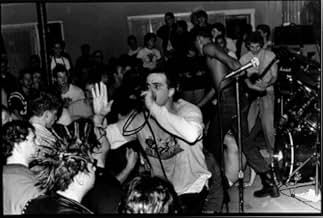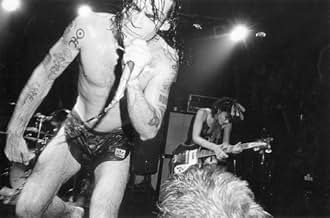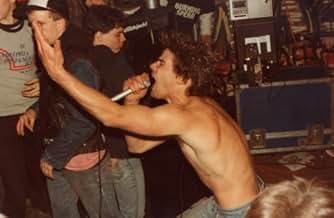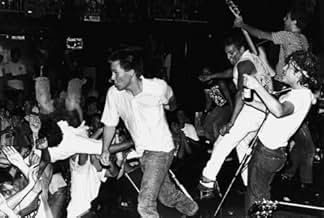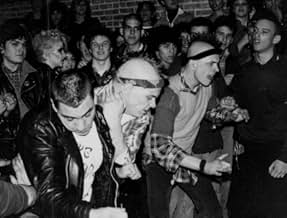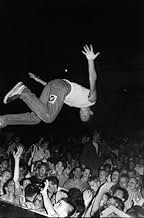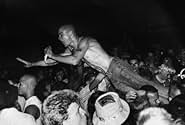NOTE IMDb
7,3/10
3,6 k
MA NOTE
Ajouter une intrigue dans votre langueThe History of American Punk Rock 1980-1986The History of American Punk Rock 1980-1986The History of American Punk Rock 1980-1986
James Drescher
- Self
- (as Jimmy Gestapo)
Joe Keithley
- Self
- (as Joey 'Shithead' Keithley)
David Markey
- Self
- (as Dave Markey)
Histoire
Le saviez-vous
- AnecdotesDespite this movie talking about how Reagan's presidency gave inspiration to the whole hardcore punk scene, New York Hardcore Punk band Reagan Youth is nowhere to be heard in this documentary.
- ConnexionsFeatures Urban Struggle: The Battle of the Cuckoo's Nest (2008)
- Bandes originalesPay to Cum
Written by H.R. (as P. Hudson), Gary 'Dr. Know' Miller (as G. Miller),
Darryl Jenifer (as D. Jenifer), Earl Hudson (as E. Hudson)
Performed by Bad Brains
Caroline/EMI Records
© Bad Brains Publishing (ASCAP) 1979
Used by Permission
Commentaire à la une
Nice and nostalgic for those who were there.
Potentially misleading and perhaps too long for those who were not there and don't get the nostalgia.
My comments are more of a reaction than a review.
I won't pretend to be objective. I lived through this and experienced it differently from the 'leading lights' who were interviewed in the film. I met and even hung out with a few of the folks in the film over the three years (1980-1982) when I was in and out of NYC and Philly scenes. Of course, hardcore had not yet been commercialized at this time and none of them were regarded as legends. It's great to see that most of them are still true believers and haven't developed regrets, but it's really odd that they are still saying exactly the same things about HC that they were saying twenty years ago. Isn't hindsight supposed to be 20/20 or something? Well... really... it's all a matter of perspective, and that's the point of this review.
From 1979 to 1984 I was a member of a band which crossed over from punk to hardcore in 1980. I began with them at the age of 14 and stuck around until, as Ian Mackaye put it, "hardcore checked out". Being part of the NJ/NYC punk community, and having grown up in a small rural town in central Jersey, my perspective on the whole business is a bit different.... But, again... that's the point, isn't it?
From my point of view, the film has one major flaw - Most of the interviews seem to have developed out of a set of basic misconceptions: (1) that hardcore was about something in particular, (2) that the leaders of the most popular hardcore bands were somehow experts in what hardcore was and (3) that the portion of the country where hardcore got the most early media attention was somehow more important than the rest of the world.
I was never a big fan of hardcore's regionalism (which was a big deal in the scenes I was involved with) and was interested mainly in bands which were original, energetic and fun regardless of where they came from. Sadly, the east coast frequently exhibited symptoms of an inferiority complex because of the commercial and media attention California got - a couple of examples are the titles of early eastern Punk and HC compilations:
Philadelphia: Get Off Our Backs We're Doing it Too. NYC: New York Thrash and The Big Apple Rotten to the Core Boston: This is Boston, Not L.A.
Telling, ain't it?
Because of my own experiences, the interviews of NYC, Washington DC and Boston band members resonated more strongly with me than the California-centered stuff. Don't get me wrong, I loved the DKs, Black Flag, the CJs, Fear, X, UXA, The Avengers, and many other West-coasters, but I still reject the adoption of the archetype American Punk lifestyle which was drawn out of stereotypes imported by the mass media from California.
From my perspective, punk was truly anti-conformist, and CoC's comments about the fascist anti-fascism that became a major component of HC late in it's life were dead-on accurate. It's as if a whole bunch of fools turned on Quincy, saw an inaccurate representation of slam dancing based on things that were happening in particular parts of Southern California (where Quincy was filmed) and all-of-a-sudden decided to get mohawks and leather jackets and go beat up people at shows.
Maybe New York police have bigger and better things to do, but I do not remember a single of the 100s of shows I went to or played which were ever even threatened with a shut-down, let alone attracting the attention of more than a few squad cars. And honestly, I don't remember any NYC or Philly cops doing anything much worse than shaking their heads and rolling their eyes during these incidents. Maybe NYC punks were radically different from Calpunks, because I knew very few people in HC and/or punk who would ever espouse hating any group of people in a broad-brush manner such as police and hippies.
For me and most of my friends HC was a chance to have fun, get up on stage and play, help other people have fun, and to express ourselves socially and politically with an audience which could relate and appreciated pretty much whatever you threw at them. Most of the messages were against violence, against stereotyping, against injustice, and even against drugs. And the bands all supported each other, whether or not they agreed about politics, music or whatever. Really nice. Sure the dancing got kind of rough at times, but it only got really bad after that fateful episode of Quincy.
This is a good film. I was very excited to see the respect with which the Bad Brains were treated and the range of excellent bands chosen for the interviews. The film is really just a lengthy series of edited monologues and dialogs from interviews conducted by the director. The cinematography is straightforward and really nothing special - fine for what was intended. There are relatively few musical interludes (mostly poorly filmed cam-jobs), and no complete songs.
The film serves well as a memoir for old punks like myself, and a good introduction to the major tropes and official mythology of the hardcore movement for those of later generations. Don't mistake the generalizing opinions of the interviewees (or mine for that matter) to be representative of anything besides the individual opinions that they are, however. And remember always - no matter what anybody says about hardcore, Gang Green summed it all up better than anybody in their song "Have Fun"
We just wanna have some fun
We just wanna have some fun
While we're young enough
To get away with it.
!
Potentially misleading and perhaps too long for those who were not there and don't get the nostalgia.
My comments are more of a reaction than a review.
I won't pretend to be objective. I lived through this and experienced it differently from the 'leading lights' who were interviewed in the film. I met and even hung out with a few of the folks in the film over the three years (1980-1982) when I was in and out of NYC and Philly scenes. Of course, hardcore had not yet been commercialized at this time and none of them were regarded as legends. It's great to see that most of them are still true believers and haven't developed regrets, but it's really odd that they are still saying exactly the same things about HC that they were saying twenty years ago. Isn't hindsight supposed to be 20/20 or something? Well... really... it's all a matter of perspective, and that's the point of this review.
From 1979 to 1984 I was a member of a band which crossed over from punk to hardcore in 1980. I began with them at the age of 14 and stuck around until, as Ian Mackaye put it, "hardcore checked out". Being part of the NJ/NYC punk community, and having grown up in a small rural town in central Jersey, my perspective on the whole business is a bit different.... But, again... that's the point, isn't it?
From my point of view, the film has one major flaw - Most of the interviews seem to have developed out of a set of basic misconceptions: (1) that hardcore was about something in particular, (2) that the leaders of the most popular hardcore bands were somehow experts in what hardcore was and (3) that the portion of the country where hardcore got the most early media attention was somehow more important than the rest of the world.
I was never a big fan of hardcore's regionalism (which was a big deal in the scenes I was involved with) and was interested mainly in bands which were original, energetic and fun regardless of where they came from. Sadly, the east coast frequently exhibited symptoms of an inferiority complex because of the commercial and media attention California got - a couple of examples are the titles of early eastern Punk and HC compilations:
Philadelphia: Get Off Our Backs We're Doing it Too. NYC: New York Thrash and The Big Apple Rotten to the Core Boston: This is Boston, Not L.A.
Telling, ain't it?
Because of my own experiences, the interviews of NYC, Washington DC and Boston band members resonated more strongly with me than the California-centered stuff. Don't get me wrong, I loved the DKs, Black Flag, the CJs, Fear, X, UXA, The Avengers, and many other West-coasters, but I still reject the adoption of the archetype American Punk lifestyle which was drawn out of stereotypes imported by the mass media from California.
From my perspective, punk was truly anti-conformist, and CoC's comments about the fascist anti-fascism that became a major component of HC late in it's life were dead-on accurate. It's as if a whole bunch of fools turned on Quincy, saw an inaccurate representation of slam dancing based on things that were happening in particular parts of Southern California (where Quincy was filmed) and all-of-a-sudden decided to get mohawks and leather jackets and go beat up people at shows.
Maybe New York police have bigger and better things to do, but I do not remember a single of the 100s of shows I went to or played which were ever even threatened with a shut-down, let alone attracting the attention of more than a few squad cars. And honestly, I don't remember any NYC or Philly cops doing anything much worse than shaking their heads and rolling their eyes during these incidents. Maybe NYC punks were radically different from Calpunks, because I knew very few people in HC and/or punk who would ever espouse hating any group of people in a broad-brush manner such as police and hippies.
For me and most of my friends HC was a chance to have fun, get up on stage and play, help other people have fun, and to express ourselves socially and politically with an audience which could relate and appreciated pretty much whatever you threw at them. Most of the messages were against violence, against stereotyping, against injustice, and even against drugs. And the bands all supported each other, whether or not they agreed about politics, music or whatever. Really nice. Sure the dancing got kind of rough at times, but it only got really bad after that fateful episode of Quincy.
This is a good film. I was very excited to see the respect with which the Bad Brains were treated and the range of excellent bands chosen for the interviews. The film is really just a lengthy series of edited monologues and dialogs from interviews conducted by the director. The cinematography is straightforward and really nothing special - fine for what was intended. There are relatively few musical interludes (mostly poorly filmed cam-jobs), and no complete songs.
The film serves well as a memoir for old punks like myself, and a good introduction to the major tropes and official mythology of the hardcore movement for those of later generations. Don't mistake the generalizing opinions of the interviewees (or mine for that matter) to be representative of anything besides the individual opinions that they are, however. And remember always - no matter what anybody says about hardcore, Gang Green summed it all up better than anybody in their song "Have Fun"
We just wanna have some fun
We just wanna have some fun
While we're young enough
To get away with it.
!
Meilleurs choix
Connectez-vous pour évaluer et suivre la liste de favoris afin de recevoir des recommandations personnalisées
- How long is American Hardcore?Alimenté par Alexa
Détails
- Date de sortie
- Pays d’origine
- Site officiel
- Langue
- Aussi connu sous le nom de
- American Hardcore: The History of American Punk Rock 1980 - 1986
- Lieux de tournage
- Sociétés de production
- Voir plus de crédits d'entreprise sur IMDbPro
Box-office
- Montant brut aux États-Unis et au Canada
- 279 665 $US
- Week-end de sortie aux États-Unis et au Canada
- 18 102 $US
- 24 sept. 2006
- Montant brut mondial
- 376 057 $US
- Durée1 heure 40 minutes
- Couleur
- Mixage
- Rapport de forme
- 1.85 : 1
Contribuer à cette page
Suggérer une modification ou ajouter du contenu manquant

Lacune principale
By what name was American Hardcore (2006) officially released in India in English?
Répondre

